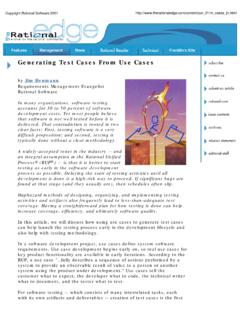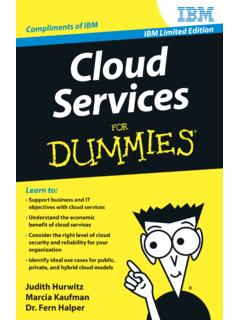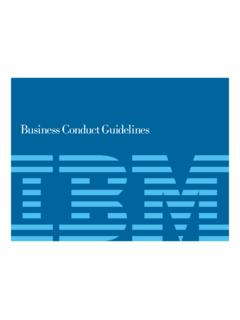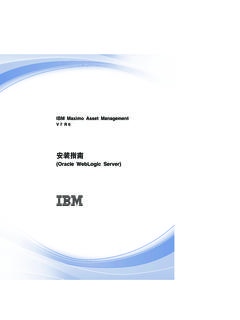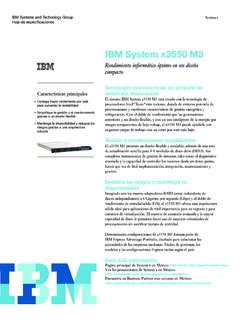Transcription of IBM AND THE FUTURE OF MOVIES
1 -1- IBM AND THE FUTURE OF MOVIES WASHER: Welcome to an IBM podcast on the FUTURE of MOVIES . I'm Tim Washer. Our guests today are Yair Landau, President of Sony Pictures Digital; and Saul Berman, IBM's global strategy lead for the media and entertainment practice. Thank you for being here, gentlemen. BERMAN: Thank you. LANDAU: Thank you. WASHER: So what we'd like to do is get an understanding of over the next three to five years how technologies will make a difference in how people view MOVIES and some other forms of entertainment. But generally we'll speak about MOVIES , both film in the theater and also on television as well. One thing I wanted to ask is, there seems to be a drive of, you know, this consumer demanding more customization -- they want to watch when they want to watch. And we're seeing that with video on demand, DVDs, that type of thing.
2 What are your thoughts on that trend and that movement. LANDAU: Well, I certainly think that we've seen that trend over entertainment as a whole. Certainly the whole nature of the music industry has been transformed by customers wanting to unbundle songs and wanting them when they want them, how they want them. And really not waiting for the music industry to figure out how to migrate post the CD but really using the Internet to transform the music industry. I think that we're at the infancy of seeing that in the motion picture side, where we have built an industry on segmenting when the consumer gets to see it in what medium, and that has built the movie pie tremendously. So what I mean by that is, it comes out theatrically both in the United States and internationally often in different timeframes than it becomes available on pay per view and VOD. Then it becomes available on DVD, and then it becomes available on pay TV, and then it becomes available on free TV.
3 In each of those windows, we charge the consumer either directly or indirectly through a service provider like HBO or ABC for the airing of the product. Now, historically that's been all well and good, but customers today want it in their homes the day we make it available in theaters. And with the proliferation of broadband and the ability for people to digitally copy our films very quickly, if we as an industry don't address that need, there's a host of external forces that will be glad to fill the void. BERMAN: The consumer wants to increasingly be able to move the content from device to device. They want to be able to watch it on whatever screen they happen to be in front of at that point in time in which ever way they want. So the industry needs to figure out as the music industry did, as Yair suggested, how to monetize what the consumer wants to do as opposed to standing in the way of what they want to do. -2- The problem is that breaks down all the traditional business models in terms of how you repurpose the content, make money from it many times over.
4 So if we look at the movie industry again, lots of problems but some interesting things along the way, that we had an album online at , we had a song online at 99 cents. But oh, by the way, if you want a 10-second clippet of that song, it's two, three or $4. We call that a ringtone. So now all of a sudden scenes or assets that we have can be divided into their bits and we may be able to monetize those bits in ways we didn't before. So what I anticipate happening in the next three to five years is a continuing compression of what we call the windows. WASHER: Okay. LANDAU: And that ultimately I think we're migrating towards a day and date availability across all medium. Even though I personally believe that the theater as the movie-going experience will remain dominant, and that is, I don't think anything will replace sitting in a large darkened room with a bunch of people sharing a common experience.
5 So three years from now, five years from now, people's preferred means of experiencing a blockbuster movie is still going to be to go to the theaters and see it together opening weekend. WASHER: Yair, can you give us an example, maybe, on how Sony is thinking about approaching some of these? LANDAU: Well, I think that, you know, Saul was saying there's potential opportunities and there's also risks. So, for example, some of the things that Sony's been doing for a long time now is actually, for several years, we've been licensing the content to mobile carriers. We just announced doing that in the US, but we've been selling MOVIES on a stream and a download basis in Italy on 3G phones for three years now. We sell Monty Python and The Holy Grail on a very small scale memory stick in a UK retailer called Car Phone Warehouse, sold thousands of copies of that for people to watch on their cell phones in the UK. WASHER: The full movie?
6 LANDAU: The full movie. Now, granted, the image size is like this, and obviously you don't get the great grandeur of the coconuts sliding together on your little screen like that, but there are people who want to consume it that way. So we have been very open to experimenting with a lot of different business models. None of them -- and this is the interesting dynamic, and this is kind of the tragic part of what's happened in the music business, is none of the digital business models yet come close to the scale of the traditional analog model. There's nothing that comes close to pay television, for example. All of the digital business models combined are a fraction of what our [Stars Encore] deal provides Sony -3- pictures for an individual movie. WASHER: Do you think that's because the audiences haven't been aggregated enough to compare? LANDAU: I think some of the audience is still in its infancy.
7 But also I think online and the audiences are more fragmented. I think that if you look at pay television, it's a 20-plus year old model when really hit its peak when there were 50 cable channels out there. Now with, you know, a thousand plus cable channels the value of an ratings on an individual pay movie are diminished as a function of fragmentation. I think online they'll never reach that level. I don't think you're ever going to reach the level where you get two, three million people watching a movie simultaneously online. WASHER: But can we get a more targeted audience that we can charge, get more revenue per head for? LANDAU: Well, I think when we ultimately compress windows, as I think inevitably we will, but I think it will take a while, you know, when it comes out day and date, yes, I think people will pay a premium for that. I think that people today have evidenced that they'll pay a premium if you could watch a movie opening night in your house, I think people would pay 20, 30, 40, maybe even $50 for that.
8 I don't know whether that will match up and ultimately make up for what we lose in box office and what we lose in the other markets. That's the big kind of industry question, is will these digital markets ultimately aggregate to the value of the historic analog markets or not. I mean, Tower Records is out of business. Tower Records is essentially done. Right? And for the music industry to do what it could to protect Tower Records and it couldn't save Tower Records and it couldn't save itself. I mean, it's kind of the inevitable evolution. So fighting to protect shelf space there is kind of a losing cause. Inevitably we have to migrate to the Internet. Advertisers in my opinion haven't woken up , they've woken up to the Internet, but they still haven't They haven't shifted enough dollars there, in part because it's just easier to buy TV spots. It's easier to monitor, you cut one spot and you air it multiple times. It doesn't require the same amount of work.
9 But you know, it's harder to sell a movie today than it was when all you needed to do was buy a spot on Friends. You know, you can't do that anymore. You used to be able to buy a spot on Friends on Thursday night and you knew you reached 30 million people who are going to the MOVIES that weekend. You can buy a spot on American Idol, that's about as close as it gets, and you still can't get to the same place. You still have to really reach the Internet audience, as Saul said. -4- I mean, the average, the target demo for a lot of our MOVIES is not watching TV. BERMAN: And even if they do record the television set, the video on the television like American Idol because they weren't able to watch it in person doesn't mean they watched it before they went to the MOVIES this weekend. They may end up watching it next week because we've done the time shift and when they watch it next week they may skip through the advertising.
10 So the advertisers are uncomfortable with that. We're starting to develop new measures; that's key. There's no standards around that. That's going to take time. But as Yair said, it's inertia. And the people in the leadership of a lot of these businesses, they ought to do business the way they've been doing it for many years. They don't know how, and most of us don't know how to do it successfully in the new model. So I think in the movie business -- and Yair can comment on this probably better than I can -- I think you're going to see a dichotomy where we continue to spend big bucks on special effects, big event kinds of MOVIES , but I think the cost of making the other MOVIES is going to have to come down. We're going to see more amateurs, non-professionals as we historically call them, that have sophisticated VH, HD DV cameras and have the editing tools to do a lot of things they didn't used to be able to do. We're going to see semi professionals making professional product and competing with the established interests who are going to have to transform how they do their business.
